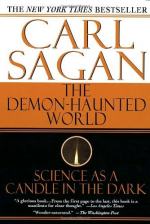|
This section contains 500 words (approx. 2 pages at 400 words per page) |

|
Chapter 16 Summary and Analysis
What is the morality of science? Do physicists have an ethical obligation to the human race and to the Earth? If science rules out the precepts and proscriptions of unscientific religion, how should scientists behave when the pursuit of their science poses grave dangers to all known life?
Carl Sagan explores these questions by presenting two contrasting portraits of physicists at opposite moral ends of the nuclear age. Dr. Robert Oppenheimer, scientific director of the Manhattan Project that developed the first nuclear bomb used to demolish Hiroshima and Nagasaki in World War II, was afterwards haunted by guilt and the sense that he and other physicists had unleashed a Pandora's box of evil that could destroy the Earth. When he told President Harry Truman that scientists now had blood on their hands, the feisty Missourian said he never wanted to see...
(read more from the Chapter 16 Summary)
|
This section contains 500 words (approx. 2 pages at 400 words per page) |

|




